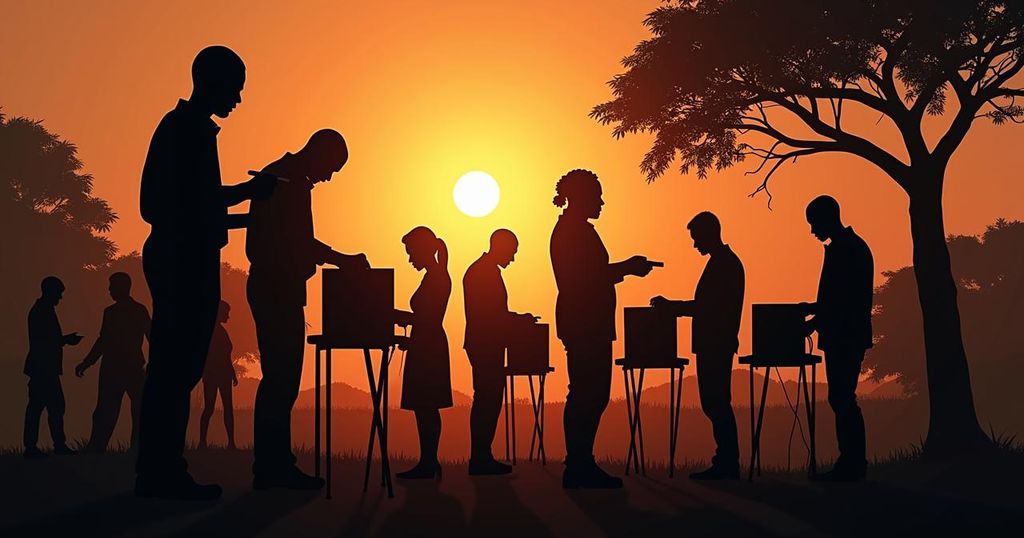Mozambicans Participate in Pivotal Presidential Election
Mozambicans are voting in an important general election, with the ruling Frelimo party expected to retain power. Daniel Chapo, a relatively unknown candidate, represents Frelimo, while his opponents include notable figures from independent and opposition parties. The election marks a historic moment as the Frelimo candidate did not partake in the independence struggle, posing new leadership dynamics as Mozambique faces significant socioeconomic challenges.
In Mozambique, citizens have commenced voting in a significant general election, in which the ruling Frelimo party is expected to maintain its long-standing position of power. President Filipe Nyusi, who is concluding his presidency after fulfilling the two-term maximum, was among the first individuals to cast his vote as polling began at 07:00 local time (05:00 GMT). The presidential candidate from Frelimo is Daniel Chapo, aged 47, a relatively obscure figure prior to his nomination, who positions himself as a reformist. His competitors include Venâncio Mondlane, contesting as an independent, Ossufo Momade, former rebel commander and leader of the principal opposition party Renamo, and Lutero Simango representing the Mozambique Democratic Movement (MDM). This election represents a pivotal moment in Mozambique’s political landscape, as it is the first time in history that Frelimo’s candidate did not participate in the independence struggle against Portugal. Chapo, born in 1977, is perceived as a candidate who is not tainted by previous corruption scandals surrounding the party. President Nyusi voted in Maputo, where early voters faced inclement weather, and subsequently urged the populace to exercise patience throughout the electoral process. “I would also ask that no group of citizens agitates or threatens others, that everything happens in peace and tranquillity and that we avoid announcing the results ahead of time,” he stated, as reported by the AFP news agency. Over 16 million Mozambicans are registered to vote in this election, and many young citizens, like 22-year-old student Augusto Ndeve Pais, express optimism regarding the future, indicating a desire for change. The primary challenge for the incoming president, according to analysts, will be to generate economic opportunities in a country where 62% of the population lives in extreme poverty, surviving on less than $1.90 per day. Mozambique, still grappling with the aftermath of a civil conflict that ended in 1992, was looking forward to economic growth driven by newly discovered natural gas reserves in the northern region. However, the Islamist insurgency that began in Cabo Delgado province in 2017 has severely disrupted such economic prospects, notwithstanding the deployment of Rwandan and South African military forces to combat the insurgents. Vote counting is scheduled to commence after the polls close at 18:00 local time, with official election results anticipated within approximately two weeks.
Mozambique has been under the governance of the Frelimo party since it attained independence from Portuguese colonial rule in 1975. The current electoral cycle is significant as Frelimo attempts to maintain its dominance in the political arena. The elections are closely watched, particularly due to the historical context, given that the Frelimo candidate, Daniel Chapo, has no direct ties to the independence war, marking a new chapter in the party’s leadership. The socioeconomic challenges faced by Mozambique, including high poverty rates and the effects of ongoing violence from insurgent groups, contribute to the urgency and importance of this election as citizens seek resolutions to their pressing economic issues.
In conclusion, the general election in Mozambique represents a critical juncture for the nation, with the potential for change amid ongoing economic struggles and political history. The participation of a new candidate from Frelimo, coupled with increased competition from opposition parties, sets the stage for a transformative electoral outcome. As the votes are cast and counted, the international community observes closely, anticipating the elected government’s capacity to address the pressing needs of its population.
Original Source: www.bbc.com




Post Comment